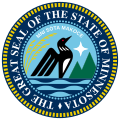| | |||||||||||||||||
| |||||||||||||||||
| |||||||||||||||||
Coleman: 30–40% 40–50% 50–60% 60–70% 70–80% 80–90% >90% Mondale: 30–40% 40–50% 50–60% 60–70% 70–80% 80–90% >90% Moore: 40–50% Wellstone: 50–60% 60–70% 70–80% Write-ins: 40–50% >90% Tie: 30–40% 40–50% 50% No votes | |||||||||||||||||
| |||||||||||||||||
| Elections in Minnesota |
|---|
 |
The 2002 United States Senate election in Minnesota took place on November 5, 2002. Incumbent Senator Paul Wellstone was running for a third term but died in a plane crash eleven days before the election. The Democratic–Farmer–Labor Party (DFL) quickly chose former Vice President and 1984 presidential nominee Walter Mondale to replace Wellstone on the ballot. Mondale had previously held the seat from 1964 to 1976, resigning to assume the vice presidency.
Contents
- Primary elections
- DFL
- Republican
- General election
- Candidates
- Campaign
- Debates
- Predictions
- Results
- Aftermath
- See also
- Notes
- References
- External links
He narrowly lost to Republican Norm Coleman, the former mayor of Saint Paul. The day before the election, Governor Jesse Ventura had appointed the 1996 Independence Party candidate, Dean Barkley, to serve the remainder of Wellstone's term. [1]
This is the last time in a midterm election that the party controlling the White House flipped a Senate seat in a state they did not win in the preceding presidential election.
This marked the first election that Mondale had lost in Minnesota. He had even narrowly carried the state against Ronald Reagan in what was otherwise his landslide defeat in the 1984 United States presidential election. He lost in 49 states, winning only Minnesota and the District of Columbia.
As a result of his defeat in this 2002 senatorial election, Mondale became the first, and so far only, major-party candidate in American history to have lost a general election in every single state. As of 2025, this is the last time a Republican won a U.S. Senate election in Minnesota, and the only time since 1994.



